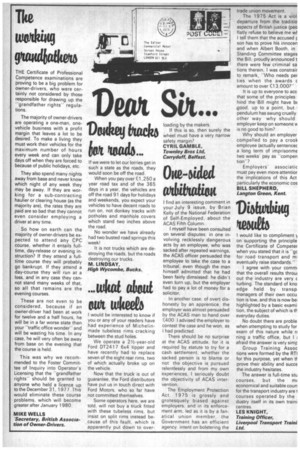Otte-koided
Page 30

If you've noticed an error in this article please click here to report it so we can fix it.
I find an interesting comment in your July 9 issue, by Brian Kelly of the National Federation of Self-Employed, about the ACAS Fifth Column.
I myself have been consulted on several disputes in one involving recklessly dangerous acts by an employee, who was sacked after repeated warnings, the ACAS officer persuaded the employee to take the case to a tribunal, even though the man himself admitted that he had 'been fairly dimsissedhe didn't even turn up, but the employer had to pay a lot of money for a solicitor.
In another case, of overt dishonesty by an apprentice, the employer was almost persuaded by the ACAS man to hand over 400 I advised the employer to contest the case and he won, as I had predicted.
There should be no surprise at the ACAS attitude, for it is required by statute to try for a cash settlement, whether the sacked person is to blame or not the objective is pursued relentlessly and from my own experiences, I seriously doubt the objectivity of ACAS intervention.
The Employment Protection Act, 1975 is grossly and grotesquely biased against employers, and in its enforcement arm, led as it is by a fanatical union member, the Government has an efficient agency. intent on bolstering the trade union movement.
The 1975 Act is a viol departure from the traditio aspects of British justice (peo flatly refuse to believe me wh I tell them that the accused r son has to prove his innocen and when Albert Booth, in Standing Committee stages the Bill, proudly announced t there were few criminal sa tions therein, I was constrair to remark, -Who needs per ties when the awards ( amount to over El 3.000?"
It is up to everyone to acc that some of the principles hind the Bill might have br good, up to a point, but pendulum has swung cruelly other way why should employer keep on someone vi is no good to him?
Why should an employer compelled to pay a crook employee (actually sentence( a long term of imprisonme two weeks' pay as "compen tion"?
Employers' associatic must pay even more attentior the implications of this Act particularly the economic cos BILL SHEPHERD,
Langton Green, Kent.




































































































